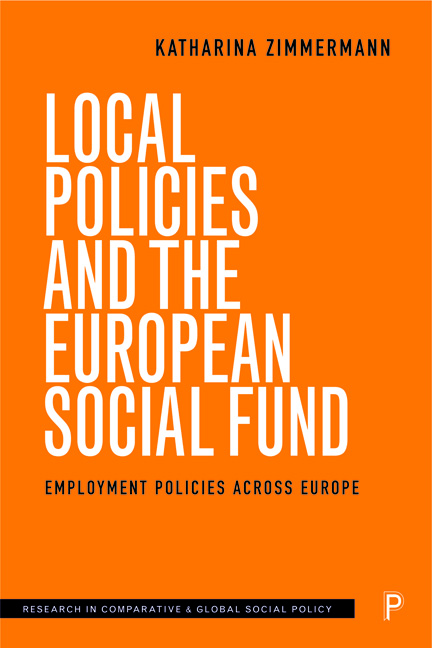Book contents
- Frontmatter
- Contents
- List of Tables and Figures
- List of Abbreviations
- Acknowledgements
- Series Preface
- 1 Introduction
- 2 Social and Employment Policies in Europe from a Multilevel Perspective
- 3 Domestic Responses to European Money: A Theoretical Perspective
- 4 The Research Programme in a Nutshell
- 5 Comparative Insights into Local Responses to the European Social Fund
- 6 What Responses Under what Conditions? Formal Qualitative Comparative Analyses and Preliminary Interpretations
- 7 Beyond Numbers: Using Case Study Insights to Support Interpretation
- 8 A Broader Perspective on Local Policies and the European Social Fund
- 9 Conclusion
- References
- Appendix: Calibration Material
- Index
4 - The Research Programme in a Nutshell
Published online by Cambridge University Press: 04 March 2021
- Frontmatter
- Contents
- List of Tables and Figures
- List of Abbreviations
- Acknowledgements
- Series Preface
- 1 Introduction
- 2 Social and Employment Policies in Europe from a Multilevel Perspective
- 3 Domestic Responses to European Money: A Theoretical Perspective
- 4 The Research Programme in a Nutshell
- 5 Comparative Insights into Local Responses to the European Social Fund
- 6 What Responses Under what Conditions? Formal Qualitative Comparative Analyses and Preliminary Interpretations
- 7 Beyond Numbers: Using Case Study Insights to Support Interpretation
- 8 A Broader Perspective on Local Policies and the European Social Fund
- 9 Conclusion
- References
- Appendix: Calibration Material
- Index
Summary
The previous chapters have provided an introduction into social and employment policies in Europe from a multilevel perspective. They pointed to the nature of the ESF as an integrated governance tool, developed an analytical perspective on ESF-induced change in local labour market policies by combining Europeanisation literature and the field theoretical approaches by Fligstein and McAdam, and derived guiding hypotheses from the literature, which I will test on the basis of empirical data. In this chapter, the more practical features of the empirical work are discussed: case selection, data collection and data processing. However, before outlining the actual design of the study, I discuss the particular epistemological framework of causality on which the design is based. In addition, as the study utilises QCA, a method that is nowadays relatively widespread in social sciences but still not part of the standard university canon, this chapter provides a brief introduction to the method's core features.
A conditional perspective and suitable tools
Understanding and explaining causality is one of the key concerns of the social sciences. Usually, scholars are either interested in the causes of an effect (y-oriented) or in the effects of a cause (x-oriented). There is also a third research perspective on causality, namely, one that focuses on the causal mechanism linking cause and effect (Radaelli, 2012: 9). With regard to the focus of this study as formulated above (that is, on the role of the ESF in local labour market policies in terms of field change and the related process of change), it is clear that both the ‘effects of cause’ perspective and the ‘causal mechanism’ perspective come into play, as a key interest of this study is in the effects of structural funding in terms of domestic change and the causal process linking the ESF and this domestic change.
Unfortunately, studying processes is a tricky task, as it is impossible at the end of the day to empirically measure the process itself (Tacq, 2011: 266). Instead, some authors have suggested studying the context under which the respective causal mechanisms operate (Falleti and Lynch, 2009). Context can be defined as the prevailing aspects of a causal setting, be they analytical, temporal, spatial or institutional (Falleti and Lynch, 2009: 1152).
- Type
- Chapter
- Information
- Local Policies and the European Social FundEmployment Policies Across Europe, pp. 45 - 60Publisher: Bristol University PressPrint publication year: 2019



